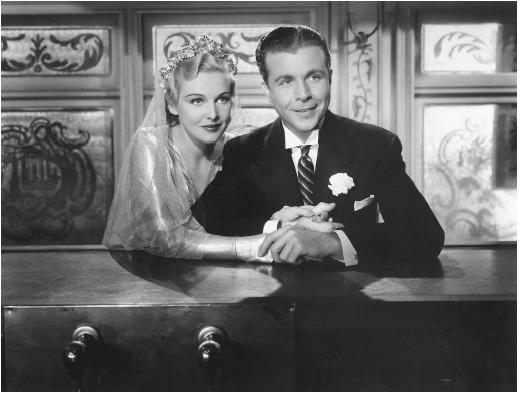Madeleine Carroll - Actors and Actresses
Nationality: British American. Born: Marie Madeleine Bernadette O'Carroll in West Bromwich, Warwickshire, England, 26 February 1906; became United States citizen, 1943. Education: Attended Birmingham University, B.A. in French. Family: Married 1) Philip Astley, 1931 (divorced 1939); 2) the actor Sterling Hayden, 1942 (divorced 1946); 3) the producer Henri Lavorel, 1946 (divorced 1949); 4) Andrew Heiskell, 1950 (divorced 1965): one daughter. Career: French teacher in girls' school in Hove, Sussex; 1927—stage debut in The Lash , London; 1928—film debut in The Guns of Loos ; 1936—film contract with Walter Wanger: made films in Hollywood; during World War II—worked with refugee orphans, then entertainment director for merchant seamen in New York; 1943–45—worked with the Red Cross in France and Italy, and subsequently with UNESCO (made documentary films for the United Nations and others: e.g. Children's Republic and The Eternal Fight ); 1948—on

Films as Actress:
- 1928
-
The Guns of Loos (Hill) (as Diana Cheswick); What Money Can Buy (Greenwood) (as Rhoda Pearson); The First Born (Mander) (as Lady Madeleine Boycott)
- 1929
-
The Crooked Billet (Brunel) (as Joan Easton); The American Prisoner (Bentley) (as Grace Malherb); Atlantic (Dupont) (as Monica)
- 1930
-
The "W" Plan (Saville) (as Rosa Hartmann); Young Woodley (Bentley) (as Laura Simmons); French Leave (Raymond) (as Dorothy Glenister); Escape (Dean) (as Dora); The School for Scandal (Elvey) (as Lady Teazle); Kissing Cup's Race (Knight) (as Lady Molly Adair)
- 1931
-
Madame Guillotine (Fogwell) (as Lucille de Choisigne); Fascination (Mander) (as Gwenda Farrell); The Written Law (Fogwell) (as Lady Margaret Rochester)
- 1933
-
Sleeping Car (Litvak) (as Anne); I Was a Spy (Saville) (as Marthe Cnockhaert)
- 1934
-
The World Moves On (Ford)
- 1935
-
The Dictator ( The Love Affair of the Dictator ; The Loves of a Dictator ; For Love of a Queen ) (Saville and Santell) (as Caroline Struensee); The 39 Steps (Hitchcock) (as Pamela)
- 1936
-
The Story of Papworth (charity appeal) (as guest); The Secret Agent (Hitchcock) (as Elsa); The Case against Mrs. Ames (Seiter); The General Died at Dawn (Milestone); Lloyds of London (King)
- 1937
-
On the Avenue (Del Ruth); It's All Yours (Nugent); The Prisoner of Zenda (Cromwell)
- 1938
-
Blockade (Dieterle)
- 1939
-
Cafe Society (Griffith); Honeymoon in Bali ( Husbands or Lovers ) (Griffith)
- 1940
-
My Son, My Son! (Charles Vidor); Safari (Griffith); Northwest Mounted Police (DeMille)
- 1941
-
Virginia (Griffith); One Night in Lisbon (Griffith); Bahama Passage (Griffith)
- 1942
-
My Favorite Blonde (Lanfield)
- 1946
-
La Petite Republique (Vicas)
- 1947
-
White Cradle Inn ( High Fury ) (French) (as Magda)
- 1948
-
Don't Trust Your Husband ( An Innocent Affair ) (Bacon)
- 1949
-
The Fan ( Lady Windermere's Fan ) (Preminger)
Publications
On CARROLL: articles—
"Madeleine Carroll" in Current Biography 1949 , New York, 1949.
Obituary in Films and Filming (London), November 1987.
Roberts, B., "Madeleine Carroll: Courage, Brains, and Beauty," Classic Images (Muscatine, Iowa), no. 245, November 1995.
* * *
Although her primary fame was for her unusually refined blonde good looks, Madeleine Carroll was nonetheless a capable film actress. Her current reputation is based on her work with Alfred Hitchcock (notably in The 39 Steps and The Secret Agent ). These were by no means the only worthwhile films she made; she was one Hollywood import who thrived on its soil. The highlights of her Hollywood years were The General Died at Dawn and the fanciful romantic epic The Prisoner of Zenda in which she played opposite Ronald Colman.
She began in the theater after attending the University of Birmingham, and entered the British film scene in the late 1920s. Gaumont British traded her for Warner Baxter, in an arrangement with 20th Century-Fox, and it was thus that she made her first American film, The World Moves On (John Ford, 1934). She returned to England for her work with Hitchcock, and finally returned to America under contract to Walter Wanger. She ended up at Paramount, and found her niche as a comedienne. Although her films were rather lackluster, her restrained and subtle performances won her a loyal following, and she remained active until the late 1940s. Her later films included a version of Oscar Wilde's Lady Windermere's Fan ( The Fan ) and a string of comedies in which she was teamed with Fred MacMurray. She also had a huge stage success in the early 1950s with Garson Kanin's Goodbye, My Fancy .
As a film actress, Carroll was notable for her underplaying, her lack of posturing or reliance on mannerism. This was unusual in an era when such qualities were more common than they are now, and perhaps explains her enduring popularity among film enthusiasts.
—Joseph Arkins
Comment about this article, ask questions, or add new information about this topic: